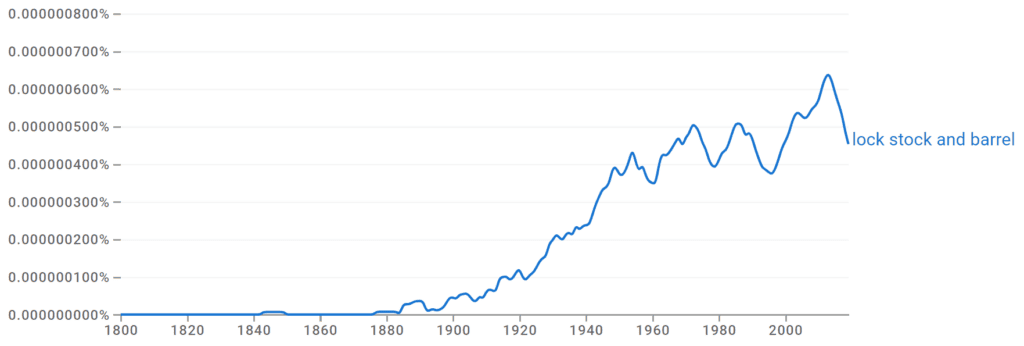Lock, stock, and barrel means the whole thing, encompassing every part of an item or situation. It’s like getting a pizza with the works; you’re not just in for the crust. Basically, if you’ve ever thought of a situation where you went all-in, this idiom applies.
Idioms like this one are expressions whose meanings aren’t directly derived from the words they contain. Instead, they have a figurative sense. In English, idioms enrich communication by adding color, depth, and cultural context. They allow speakers to convey complex ideas succinctly and often with a touch of humor or local flavor.
These three words come together to indicate everything. But why these three? Why not just say everything, then? It has to do with the origin of this phrase, going back to old-fashioned firearms. This quick guide explains this idiom’s meaning and origin and shares a few sentence examples to understand its use.
Lock, Stock, and Barrel Meaning

The idiom lock, stock, and barrel is used to describe the entirety of something, down to its minutest detail.
This idiomatic expression is crucial in various fields like business, art, science, and philosophy. Recognizing and appreciating each element is paramount in these domains, as they come together to form a complete picture or understanding.
Through this idiom, the emphasis is placed on both the macroscopic view and the value of each microscopic component, encouraging thoroughness in all endeavors.
How Do You Punctuate the Idiom Lock, Stock, and Barrel?
It’s typically written as lock, stock, and barrel using the Oxford comma for clarity, as most style guides recommend.
Lock, Stock, and Barrel Origin and Etymology

The phrase lock, stock, and barrel dates back to the 1800s and refers to the three main components of a musket. The “lock” is the firing mechanism, the “stock” is the wooden handle or butt, and the “barrel” is the part through which the bullet travels. Owning all three parts meant possessing the entire musket. Over time, the idiom evolved to signify having or owning something in its entirety.
Sir Walter Scott first used the phrase in this context in an 1817 letter, stating, “Like the High-landman’s gun, she wants stock, lock, and barrel, to put her into repair.”
Lock, Stock, and Barrel Synonyms
- Hook, line, and sinker
- Whole hog
- The whole kit and caboodle
- From A to Z
- The whole megillah
- Top to bottom
- Whole enchilada
- The full monty
- The whole shebang
- From start to finish
Examples of Lock, Stock, and Barrel in a Sentence

- When he bought the company, he acquired it lock, stock, and barrel.
- They adopted the new software system, lock, stock, and barrel.
- It’s not just the building; they own the entire property, lock, stock, and barrel.
- After years of collecting, he donated his vintage toy collection lock, stock, and barrel to the museum.
- We were amazed; she recited the poem lock, stock, and barrel.
- The town was taken over lock, stock, and barrel by the film crew for the documentary about our province.
- They decided to move across the country, taking their belongings lock, stock, and barrel.
- You can’t just accept his theory lock, stock, and barrel without evidence.
- The family next door moved lock, stock, and barrel to a new city for better opportunities.
End of the Road
The idiom lock, stock, and barrel is a classic example of how language can take everyday items, such as parts of a gun, and give them a broader metaphorical meaning. Stock up on more of my idiom guides for a fuller vocabulary!
